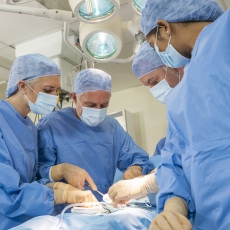
There are many reasons to have surgery. Some operations can relieve or prevent pain. Others can reduce a symptom of a problem or improve some body function. Some surgeries are done to find a problem. For example, a surgeon may do a biopsy, which involves removing a piece of tissue to examine under a microscope. Some surgeries, like heart surgery, can save your life.
Some operations that once needed large incisions (cuts in the body) can now be done using much smaller cuts. This is called laparoscopic surgery. Surgeons insert a thin tube with a camera to see, and use small tools to do the surgery.
- Surgery (National Library of Medicine)There are many reasons to have surgery. Some operations can relieve or prevent pain. Others can reduce a symptom of a problem or improve some body function. Some surgeries ...
- Weight Loss Surgery (National Library of Medicine)Weight loss surgery helps people with extreme obesity to lose weight. It may be an option if you cannot lose weight through diet and exercise or have serious ...
- Plastic and Cosmetic Surgery (National Library of Medicine)... reshape the appearance of body parts through cosmetic surgery. Some of the most common body parts people want to improve through surgery include: Breasts: Increase or reduce the size of ...
- Heart Surgery (National Library of Medicine)What is heart surgery? Heart surgery can correct certain heart problems when other treatments haven't worked or can't be used. In some cases, heart surgery ...
- After Surgery (National Library of Medicine)... side effects. There is usually some pain with surgery. There may also be swelling and soreness around ... the first few days, weeks, or months after surgery. Some other questions to ask are: How long ...
- Coronary Artery Bypass Surgery (National Library of Medicine)... t help, you may need coronary artery bypass surgery. The surgery creates a new path for blood to flow ... more than one bypass. The results of the surgery usually are excellent. Many people remain symptom-free ...
- Laser Eye Surgery (National Library of Medicine)For many people, laser eye surgery can correct their vision so they no longer need glasses or contact lenses. Laser eye surgery reshapes the cornea, the clear ...
- Your child had surgery to repair a heart defect . If your child had open-heart surgery, a surgical cut was made through the breastbone ...
- Heart bypass surgery creates a new route, called a bypass, for blood and oxygen to go around a blockage in the coronary artery to reach your heart muscle. The surgery is used to treat coronary heart disease. This ...
- You were in the hospital for spine surgery. You probably had a problem with one or more disks or spine bones. A disk is a cushion that separates the bones in ...



